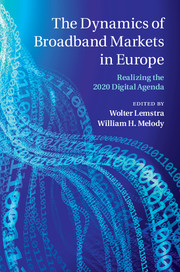'After two decades of regulatory convergence the major global regions have pursued more differentiated paths during the past decade. In contrast to the US which adopted a framework steeped in minimally regulated markets and the government-centric approaches of many Asian nations, the EU has pursued a hybrid model combining competition, regulation and forms of industrial policy intervention. The national diversity that exists within the common European framework constitutes a natural experiment from which important lessons can be learned. The case studies assembled and expertly analyzed in this volume provide unique insights into the diversity of policy models across the EU, the effects of these choices for sector performance, and options for pursuing the ambitious goals of the Digital Agenda for Europe.'
Johannes M. Bauer - Michigan State University and Chair, Telecommunications Policy Research Conference, 2010–13
'The authors are to be congratulated on producing such a rigorous and subtle analysis of the commonalities and the differences between Europe’s national broadband markets - competitive markets are good but bringing broadband to everyone will require pragmatic public and private approaches. The analysis here provides policy makers with the solid foundation needed for wise future policy to stimulate broadband investment and take-up.'
Colin Blackman - Editor, info and Director, Digital Forum, Centre for European Policy Studies
'One of the most important messages from the research in this book is that for the next stage of broadband infrastructure and digital economy development, there is no single policy pathway to success. Each country’s unique legacy may be the most important factor in determining the set of policies and practices necessary to meet the EU Digital Agenda objectives. A common model of policy reform, such as the liberalization model that has been widely applied with significant success in the past, is no longer sufficient. The most important determinants of success will be government policies and industry investment programs that build on each country’s historical and cultural development, and its current economic and governmental structure.'
Jørgen Abild Andersen - Chairman, OECD Committee on Digital Economy Policy and former Director General, National IT and Telecom Agency, Denmark, 1991–2011
'It is refreshing to see an analysis that focuses on the 'market dynamics' of broadband growth in Europe, and how it affects policy implementation in different countries. The well-documented conclusion that achieving the EU 2020 broadband targets requires country-specific policy implementation strategies is an important message for both market players and policymakers. The next step is the recognition that this can best be done with a single European telecom regulator.'
Ben Verwaayen - former CEO of KPN, BT and Alcatel-Lucent



